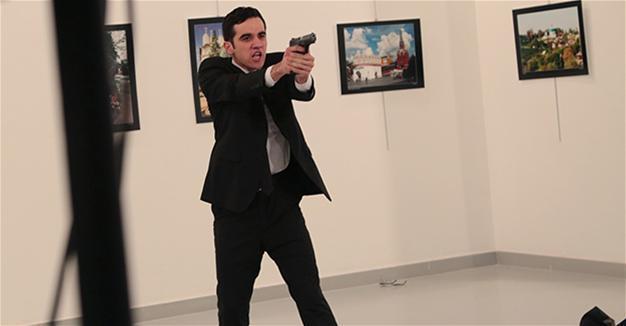Details emerge regarding Karlov assassination
ISTANBUL

AP photo
Details continue to emerge regarding the assassination of the Russian Ambassador to Turkey Andrey Karlov, who was killed late on Dec. 19 by a Turkish police officer in central Ankara.
Mevlüt Mert Altıntaş, the police officer who killed Karlov before being shot dead by police, was involved in an investigation into the Fethullahist Terrorist Organization (FETÖ) in 2015, Fevzi Kızılkoyun from daily Hürriyet reported. He participated in the meetings of the Gülenists in the western province of İzmir, according to a report dated Aug. 13, 2015.
Another possible FETÖ suggestion was involved in the column of daily Hürriyet columnist Abdülkadir Selvi, who claimed soon after the attack that the outlawed group was behind the murder of the Russian envoy.
Selvi also said Altıntaş participated in eight programs of President Recep Tayyip Erdoğan in the Turkish capital Ankara after the July 15 failed coup attempt, believed to have been masterminded by the Gülenists.
“There are interesting connections of Altıntaş. The assassin police officer was on duty for eight programs of President Erdoğan in Ankara after July 15,” Selvi wrote, adding that he was among the unit that provided domestic security.
“He was in the unit that provided domestic security after the presidential guards. God forbid, he could have also acted there,” he also wrote.
Noting that what Altıntaş did on the night of the thwarted coup is unknown, Selvi noted that “the FETÖ member police officer” took a one-day leave of absence around 7:45 a.m. on July 15 in Ankara.
In his column, Selvi questions who aided and abetted the killer.
“The connections should be brought to light. From whom he took the assassination order and who helped him should be enlightened. More significant than all these, why was the Russian ambassador chosen as a target? What was the message that was attempted to be given to Turkey with this assassination?” he asked.
Selvi also said “a force” was not permitting Turkish-Russian relations to develop.
“For this reason this force is engaging in heavy provocations,” he said.
Saying that Gülen finds the accusations “ridiculous,” Selvi noted that whatever he finds “ridiculous” is whatever he is involved in.
“He found the accusations in July 15 coup attempt ridiculous. The coup-plotting generals confessed that they got the orders from Fethullah Gülen. Know that whatever Gülen finds ridiculous, he is involved in it,” he also wrote.
Selvi did not elaborate as to how a police officer with alleged links to Gülen managed to escape the mass dismissals of police officers and other civil servants since the July 15 coup, which has been blamed on Gülen.
Muharrem Sarıkaya from daily Habertürk also stressed the possible FETÖ links of Altıntaş.
“The schools and courses that he went to, his family data display his FETÖ connections,” Sarıkaya wrote, adding that his connections were being investigated.
Sarıkaya also gave details of the events that unfolded on the night of the assassination, saying the police shot him dead because they thought he might have been a suicide bomber.
“Altıntaş continued to fire shots inside the Contemporary Arts Center after shooting the ambassador. The traffic police took the first precautions as other police officers arrived at the scene. When the officers told him to surrender, he refused, saying that ‘he was there to die’ and continued to fire shots. He also gave the same answer to the Special Forces that arrived at the scene. After that he was shot in the leg. He fell to the ground, but didn’t stop. When he attempted to put his hands in his pocket the police thought that he might be a suicide bomber,” Sarıkaya also said.
Police subsequently shot to kill, Sarıkaya said, adding that the police did not know that Altıntaş was a police officer.
“A police officer summed the events up to me like this: ‘We didn’t know that he was a police officer until we killed him. We got suspicious that he was about to detonate a bomb in the building when he put his hand in his pocket. There were a lot of civilians in the building and the ambassador might have been alive,’” he also wrote.
Moreover, daily Sözcü columnist Uğur Dündar also pointed to the fact that Altıntaş might be a Gülen follower.
“The first findings point to the fact that Altıntaş might be a FETÖ member,” Dündar wrote, as he characterized the incident as a “very dire event.”
“According to the comments in the media, it could emerge that the terrorist might be from one of the assassination cells of FETÖ,” he added.
Nedim Şener, a columnist from daily Posta, questioned the motives of the assassination, as he said Altıntaş went to a course linked to the Gülenists in the Söke district of the western Aydın province. Saying Altıntaş’s education expenses were net by the FETÖ fugitive businessman Şahin İlgi, Şener noted that FETÖ might emerge from the attack, even though the assassin voiced statements linked to al-Nusra during the attack.
Meanwhile, Banu Şen from daily Hürriyet spoke to the people who knew Altıntaş in Söke, with many voicing surprise at his actions.
“Altıntaş was born on June 24, 1994. He was in Söke until high school. According to the allegations, he registered at the Körfez course for a while, which is now closed,” she wrote, before citing what Altıntaş’s teacher from high school said about him.
“He was a joyful and good child. He didn’t harm anybody or cause any unrest,” the teacher, who wished to remain anonymous, told daily Hürriyet.
Altıntaş shot Karlov while the latter was making a speech at the photography exhibition.
